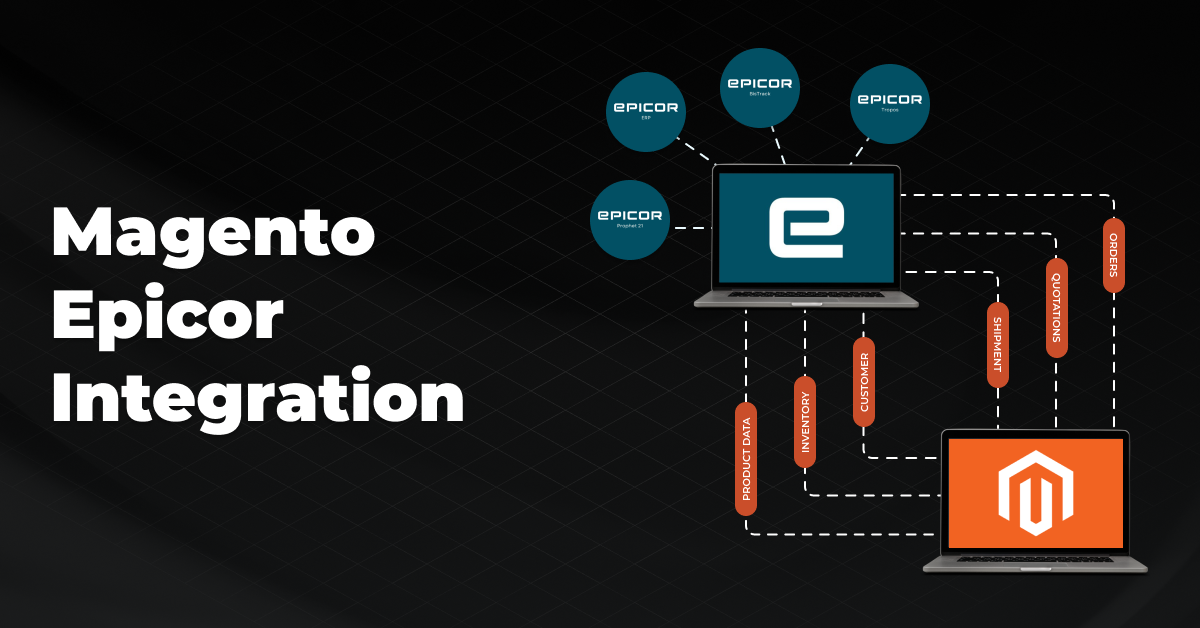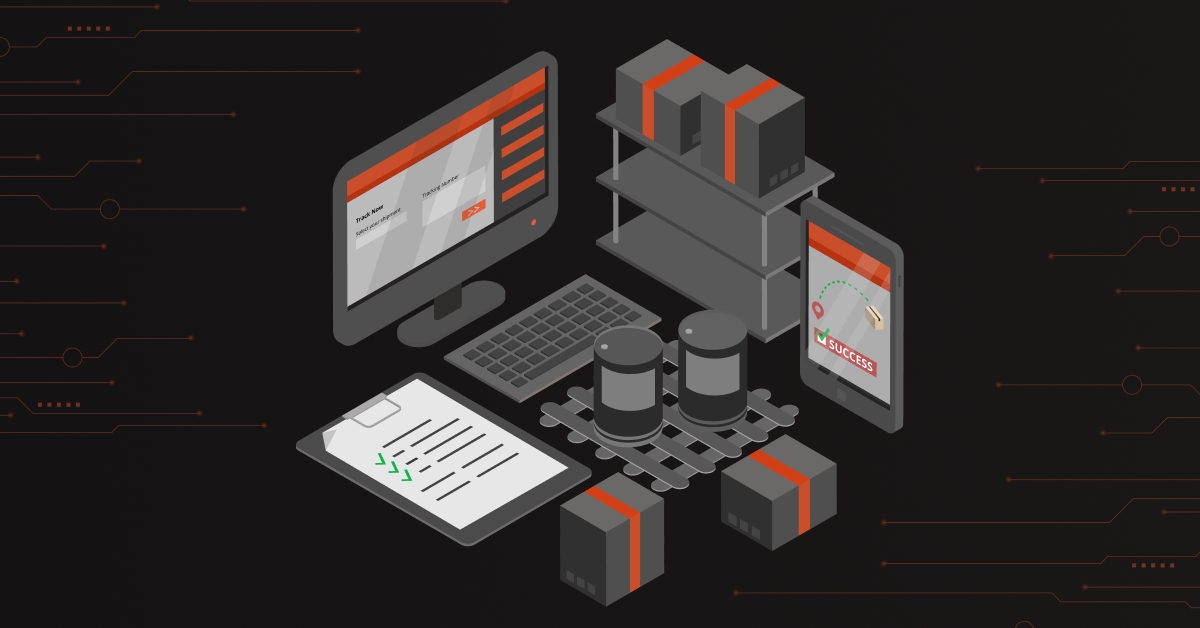Magento Epicor Integration involves linking the Magento ecommerce platform (now Adobe Commerce) with the Epicor ERP system. This integration streamlines data flow between online storefronts and back-end operations, enhancing efficiency and accuracy. Businesses often integrate Magento with Epicor to optimize resource utilization, minimize manual data entry, and improve overall operational coherence in managing both the online and offline aspects of their business.
Contents
Methods of Magento Epicor Integration
Here’s how you can go about it.
Step 1: Choose the Right API
DCKAP Integrator’s API
- DCKAP Integrator’s API offers comparable functionality to Epicor Commerce Connect (ECC) but with more flexible pricing.
- Users benefit from real-time inventory management, order tracking, and customer account management features.
- DCKAP Integrator provides a transparent and predictable pricing model, including complimentary access to the P21 API along with the ERP Integrator platform, simplifying budgeting and planning for integration requirements.
- The user-friendly UI of the API integration module ensures easy management of data synchronization between systems.
Epicor Commerce Connect (ECC)
- ECC is a well-established process for integrating Epicor with Magento, refined through years of upgrades and solution implementation.
- Expect overhead expenditures covering ECC (Epicor Commerce Connect), consultation, additional IT employees, and Epicor training.
- Engage with an Epicor representative or a third-party vendor like Elogic for a self-conducted integration, receiving source code, documentation, the Analyzer, and access to the Epicor Learning Center for guidance.
- Choose ECC based on your specific requirements, considering factors like scalability, efficiency, and the level of customization needed for Magento Epicor Integration.
Step 2: Verify System Requirements
- It is always a good idea to double-check the system requirements to understand the precise version your shop will use.
- If the technical details seem complex, consider engaging a Magento developer to overcome tech stack limits and align your Magento system with Epicor’s needs.
Step 3: Start Integrating Through Any of The Following Methods
Point-to-Point
- Connects applications using a custom connector.
- Prone to brittleness: changes in applications may require rewriting the entire connector.
- Expands exponentially with more applications, making scalability challenging.
Enterprise Service Bus (ESB)
- Acts as a communication layer moving data between applications.
- More efficient than point-to-point systems but has limitations on data processing and can create bottlenecks.
Third-Party Integrator (Integration Platform as a Service – iPaaS)
- Seamlessly connects ERP and eCommerce websites.
- Handles integration independently using APIs for smooth processes.
- Efficiently manages the entire integration process without the need for extensive custom coding.
Selecting the integration method depends on factors like scalability, efficiency, and the level of customization required for your Magento Epicor Integration.
Also read: Magento Systems Integrator Explained [+How to Pick the Right One]
Benefits of Magento Epicor Integration
Here are the major benefits of integrating Magento ecommerce platform and Epicor ERP:
Workflow Automation
By integrating Magento with Epicor software, you access the power of streamlined workflows. Automation eliminates the hassle of manual tasks, ensuring processes run seamlessly. This efficiency not only saves much time but also enhances overall productivity, allowing your team to focus on strategic aspects of your business.
Customer Management
Simplify the often tedious task of managing customer data. The integration seamlessly syncs customer information such as customer accounts, complete account history, customer billing details between Magento and Epicor, automating updates when customers fill out profiles on either platform. This eliminates the manual effort required for data entry, especially beneficial for larger companies. Additionally providing an unparalleled experience to the customer base.
Product Management
With Magento Epicor Integration, maintaining product records becomes effortless. The tight integrations bring your ERP system and online store together, facilitating seamless synchronization of product information. Manual syncing is a thing of the past, ensuring accurate and up-to-date product details and significantly improving overall product management efficiency.
Order Management
Provide assurance to your customers and maintain a detailed order history effortlessly with Magento Epicor Integration. The synchronized order details on both platforms offer real-time visibility. This transparency not only meets customer expectations but also aids business owners in making efficient deliveries and providing timely after-sales services.
Pricing Management
Manage crucial functions like shipment, customer returns, and taxation seamlessly. Calculate rates effortlessly on product listing pages and details, offering buyers a seamless checkout experience. This integration simplifies pricing information management, providing a hassle-free and reliable transaction process for your customers.
Also read: Magento ERP Integration Explained [+Case Studies]
Top Tools to Integrate Epicor and Magento
1. DCKAP Integrator
DCKAP Integrator is a premier industry-specific system ideal for distributors. It forges a seamless connection between your Magento store and the Epicor ERP.
This integration solution distinguishes itself by delivering a hassle-free software integration experience, leveraging pre-built connectors that eliminate the need for manual coding. This approach not only accelerates the integration process but also enhances overall efficiency.
Features and Benefits
- DCKAP Integrator’s API is a Cost-effective alternative to Epicor Commerce Connect.
- User-friendly UI in DCKAP Integrator for effortless data synchronization between systems.
- Powerful tool for managing Magento systems efficiently.
- The Flow Designer in ensures a rapid and efficient integration process for Magento.
- Low-code Environment
Cons
- Users might encounter limitations in tailoring the integration to specific or advanced requirements.
2. Jitterbit
Jitterbit emerges as one of the top choices for Magento Epicor Integration, offering a streamlined solution for efficient data management. With Jitterbit one can easily automate the intricate data exchange between Magento and Epicor effortlessly.
Real-time inventory updates across your online platform, physical stores, and warehouse become a breeze, ensuring your customers receive accurate information at all times. The automation of shipping details from Magento to Epicor upon order fulfillment enhances order processing efficiency.
Features and Benefits
- Reduction of transactional errors by a substantial percentage
- Speeds up your order-to-cash cycle time
- Workflow automation
Cons
- Costlier solution for smaller businesses
- Complex onboarding
3. MuleSoft
MuleSoft seamlessly integrates Magento and Epicor by leveraging its advanced integration capabilities. Through dedicated connectors for both Magento and Epicor, MuleSoft facilitates the smooth exchange of data between these platforms.
The Anypoint Platform enables efficient mapping and transformation of data, ensuring compatibility between the systems. Real-time synchronization is established, encompassing vital information such as product details, inventory levels, customer data, and orders.
Features and Benefits
- Event-driven architecture for dynamic integration
- Robust error handling ensures reliable processes
- Scalable solution for growing business needs
- User-friendly interface for seamless operations
Cons
- Steeper learning curve for beginners.
- Relatively expensive, especially for small businesses.
- Requires dedicated resources for implementation and maintenance.
- Complex integrations may take longer to deploy.
4. Celigo
Celigo’s integrator.io emerges as a top-tier solution for Magento Epicor Integration, offering a complete iPaaS that streamlines key business processes at scale.
The Celigo Platform provides a wealth of managed, prebuilt solutions enriched with best practices, AI, and machine learning. This comprehensive library facilitates a streamlined integration process. Notably, Celigo ensures accessibility for everyone, offering an approachable user experience for business users to confidently create and manage automations aligned with their evolving ecommerce business processes.
Features and Benefits
- Incorporates pre-built automation and best practices for efficient integration.
- wide range of pre-built connectors
- Modern and intuitive UI
- Responsive and supportive customer service
Cons
- Complex cost structure
- Learning curve
- Dependency on third-party connectors for integration
5. Integrate.io
Integrate.io stands out as a top-tier option for Magento Epicor Integration, presenting a low-code solution that simplifies the complexities associated with custom connectors.
The platform’s prowess lies in its prebuilt APIs, which seamlessly facilitate the connection between Magento and an extensive array of popular tools. Users can effortlessly collect specific data by selecting endpoints, and the intuitive backend enhances the configuration of ETL pipelines for a smoother integration process.
Features and Benefits
- Setting up a Magento connection is quick and efficient.
- Leverages the Magento Web API for enhanced connectivity.
- Tailored for compatibility with Epicor systems.
- Facilitates a smooth authentication process for secure integration.
Cons
- limitations on customization possibilities for the integration procedure.
Also read: Magento CRM Integration: What You Need To Know
Ideal Choice for Distributors – DCKAP Integrator
DCKAP Integrator is a cloud iPaaS, offering specialized and top-notch integration solutions tailored to your unique business needs. Our team of experts possesses a deep understanding of the intricacies of both the Magento store and Epicor ERP platforms, guaranteeing a simplified integration process that is both seamless and efficient.
Check out our pricing plans today and understand how we can fit your budget, ensuring that you leverage the maximum benefits from your integration investment.
With DCKAP Integrator, level up your distribution business with streamlined processes between Magento and Epicor with reduced operational costs and full lifecycle solutions.
FAQS
What is eCommerce and ERP Integration?
eCommerce and ERP integration is the process of connecting an ecommerce platform (such as Magento, Shopify, or WooCommerce) with an Enterprise Resource Planning (ERP) system. This integration allows seamless data exchange between these systems, improving overall business efficiency.
What is Epicor Magento Integration?
Epicor Magento Integration refers to the process of connecting the Epicor enterprise resource planning (ERP) system with the Magento ecommerce platform. This integration facilitates seamless data flow between the two systems, optimizing complex business operations.
Why is Magento Epicor Integration important?
Integration between Magento and Epicor enhances operational efficiency by automating tasks such as supply chain management, inventory management, and customer relationship management. This Integration is designed to enhance the performance and speed of your ecommerce technology platform, resulting in faster and more accurate order fulfillment, reducing the likelihood of errors and improving customer service.
What data can be synchronized between Magento and Epicor?
The integration typically allows the synchronization of various data, including rich product information, customer data, sales orders, inventory levels, customer-specific pricing, and shipping details. This ensures consistency and accuracy across both platforms.
How does Magento Epicor Integration contribute to an innovative digital commerce solution?
Integration brings innovation to your digital commerce by seamlessly connecting the innovative features of Magento with the robust capabilities of Epicor, creating a single source of truth and an advanced platform for your ecommerce operations.
Is Epicor Magento Integration scalable for businesses of different sizes?
Yes, Epicor Magento Integration is scalable and can be tailored to meet the needs of businesses of varying sizes. Whether you are a small business or a large enterprise, the integration can be customized to fit your specific requirements.
Can I get support for version-specific integration issues with Epicor and Magento?
Yes, professional support is often available for version-specific integration issues. Business intelligence can rely on their integration provider for assistance in addressing any challenges related to integrating Magento with specific versions of Epicor, such as Epicor Prophet 21, Epicor Eclipse, or ERP 10.
How does opting for a managed service in Magento Epicor Integration benefit my business?
A managed service provides ongoing support, maintenance, and updates for the integration. This ensures that your integration remains robust, secure, and up-to-date, allowing you to focus on your core business while experts manage the technical aspects.




